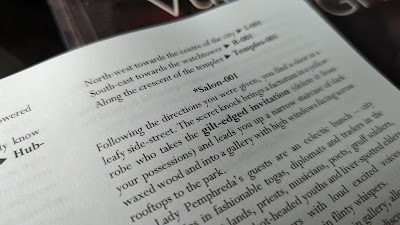A little addendum to my previous post about using AI referees for roleplaying games. I thought I'd try Bing on the same scenario to see if it did any better. I quickly encountered a priest, Father Thomas, who told me about a cult of Set hiding out in the forest. Not very Dragon Warriors, but already Bing was weaving a more convincing and complex adventure than Bard had managed.
"Destroy them in the name of the True Faith," said Father Thomas.
I said I'd need a guide and he added, "There is a man named Giles, who lives in the tavern. He is a hunter and a tracker, and he knows the forest well. He might be willing to guide you to the cult’s lair, if you pay him well. He is a bit of a rogue, not given to trusting people."
At the tavern I went up to Giles's room. In answer to my knock, a gruff voice demanded, "Who's there?" Bard suggested five ways to convince him to open the door: telling him the truth, claiming to be another hunter, shouting that I was the law and I'd break the door down, etc.
I thought I'd try something else. "I'm a prostitute and I'm offering a half-price introductory deal."
Bing really didn't care for that:
I was impressed at how well it captured a tone of passive-aggressive prissiness, but obviously in this form it is never going to be any use for serious roleplaying. Is it worried about age-appropriateness? But Bing knows my age, as it's linked to my Microsoft account, and if I leave my computer where a 10-year-old can use it then Bing's responses are a drop in the ocean compared to all the murky sites that hypothetical 10-year-old might stray onto. (Yes, definitely use parental locks; I agree with that.)
Teofilo Hurtado later drew my attention to a section from the 1st edition of the AD&D Dungeon Master's Guide:
Gary must never have seen Midnight Cowboy or he wouldn't have assumed all prostitutes were female... but I digress.
Of course, it's not that I want a game full of "saucy tarts" and "brazen strumpets", but if you're going to run a game in which clerics tell knights to go and kill other people because of their beliefs, it really is ninnyish to get in a snit over any mention of sex. Coincidentally, a few days later I tried posting this clip on Facebook in response to a question about whether it's worse to lose your job just before or just after Christmas:
The AI that polices Facebook's community standards wasn't having that. "You appear to be promoting hate speech," it complained. Now, I can understand it having an aversion to a lot of Stephen Moffat's writing, but I thought that line from "The Bells of Saint John" was rather funny. Facebook's AI is generally pretty useless at keeping actual hate speech and porn off public groups, so how come the merest mention of killing got this Doctor Who clip censored?
Will all references to sex and murder be stamped on by our AI police in future? If so, that's a lot of literature, cinema, opera and games that will just come up as a blank screen. These AIs are going to be pretty useless if they live in the world as imagined by twitty puritans. As Mark Twain said (or did he?), “Censorship is telling a man he can't have a steak just because a baby can't chew it.” So we can all breathe a sigh of relief; human art is still the only kind worth having.














.jpg)








